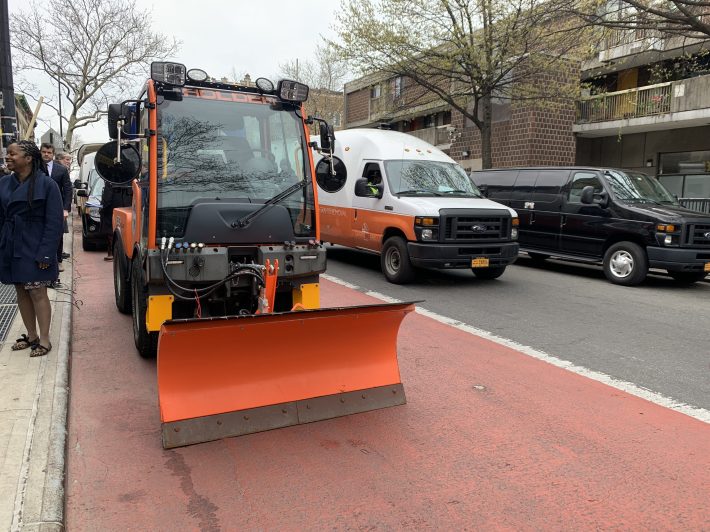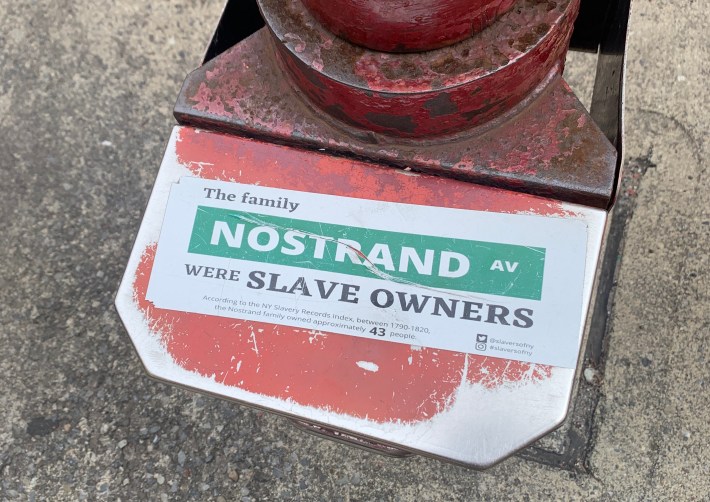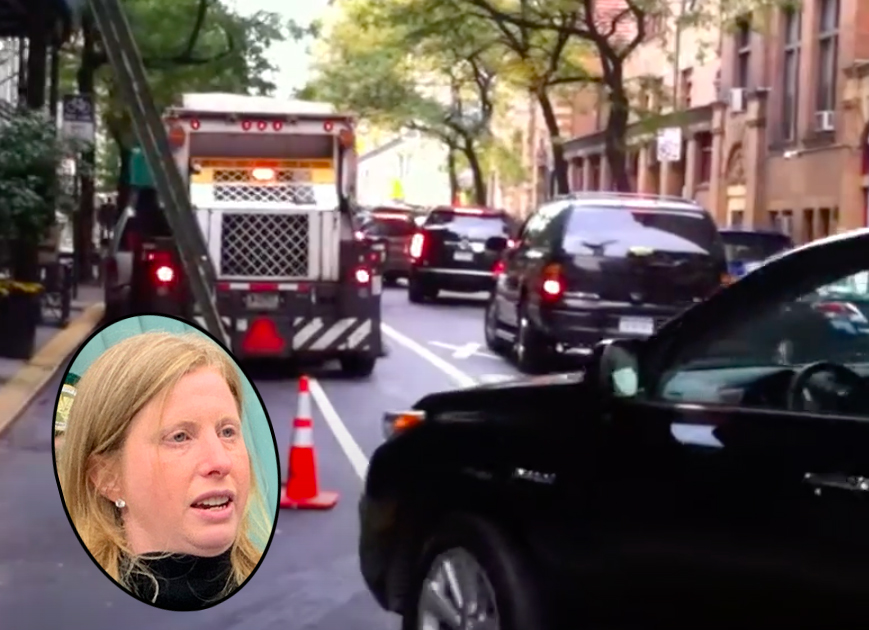This year, Independence Day is on July 5.
That's the day when the city will restore full street sweeping, ending the de Blasio administration's Covid-era reduction in alternate-side-of-the-street parking that led to filthier streets as entitled drivers frequently didn't bother to move their cars.
New Sanitation Commissioner Jessica Tisch made the announcement as part of a triple-barreled press conference on her very first day that also featured a commitment to boost funding so that the agency's beloved fleet of narrow snow plows could be refitted to sweep protected bike lanes all year long.
Tisch also committed to restoring the suspended composting program, which she called "urgently needed," in the next few months.
The big news was that by restoring twice-a-week street sweeping, the city will no longer be encouraging drivers to secure unfettered street parking by simply eating the $65 once-a-week ticket — a fraction of the cost of garage parking in most neighborhoods.
The restoration, Tisch said, was "desperately needed." It will cost $1.9 million in the fiscal year starting July 1.
"The partial suspension of alternate-side-of-the-street parking was a pandemic measure to let people stay inside, but it went on for far too long and largely sidelined the best tool in our arsenal: the mechanical broom," she added. "The dirty little secret is that when alternate-side-of-the-street parking went to one to one day a week instead of two, in practice, it was like having no cleaning on many blocks in this city. ... Too many people saw once-in-a-while ticket as just the cost of doing business."
Have you heard the complaints about filthy streets and rats? Our streets are filthy because people aren’t moving their cars for the one day of sweeping. It’s cheaper to get a ticket than to garage. Let’s change this. @NYC_DOT @NYCSanitation @CMReynoso34 pic.twitter.com/RMrI8wkSkf
— Streetopia Upper West Side (@StreetopiaUWS) June 22, 2021
Members of the City Council hailed the announcement, which came days after the Council demanded billions of dollars of restorations from the mayor's preliminary budget. The Council still wants more litter baskets, rat mitigation, organics drop-off sites, e-waste collection, highway ramp cleaning, illegal dumping enforcement, and lot cleaning, Speaker Adrienne Adams said in a statement — but she ultimately praised the mayor for the restoration of street sweeping and the $9.5-million commitment to clear the bike lanes. (Two-thirds of that money will be spent to acquire the equipment and the remaining third is for staff to operate them.)
Not all advocates were convinced. On the Upper West Side, whole blocks have remained almost entirely unswept during the pandemic because wealthy car owners either don't move their car at all, or spend the 90 minutes of alternate-side parking simply idling in their cars so they can avoid parking tickets.
That's what Andrew Rosenthal has observed for months on his block of West 78th Street. The increase in car ownership during the Covid pandemic, plus the use of curbside space to save the restaurant industry and its tens of thousands of jobs, has led to fewer free places in the public right of way for car owners to store their private property. As a result, Rosenthal said, people would rather sit in their cars, idling, for 90 minutes rather than give up "their" spot.
"Even if they gave tickets twice-a-week now, that's still hundreds of dollars less than a garage," he said. "So I'm not convinced today's announcement will change anything."
The community group Streetopia Upper West Side was also dubious.
"We're concerned that a return to twice-a-week alternate-side-of-the-street parking would double the amount of time drivers spend idling and circling the block, resulting in dirtier air and more dangerous conditions for pedestrians and cyclists, especially at intersections where the majority of crashes occur," said the group's director, Carl Mahaney, who called for "massively increased fines and stepped up enforcement."
Mahaney called on the city to completely reframe the issue and alter the decades-old arrangement that basically institutionalizes the curbside lanes as "parking" spaces — which was not the case until the original overnight-parking ban was overturned in the 1950s.
"A system that relies on residents to move their personal property once or twice a week to maintain basic cleanliness and ensure public health should probably be rethought," Mahaney said.

Less controversial was Tisch's announcement that her agency would use its fleet of leased narrow snow plows to keep bike lanes clear. The announcement follows a Feb. 28 letter from Manhattan Borough President Mark Levine to the departments of Transportation and Sanitation urging them to expand the fleet of narrow plows and sweepers so that protected bike lanes will no longer have to be wide enough to accommodate a standard 11-foot-wide Sanitation truck — a design that has encouraged drivers to enter bike lanes.
"Our amazing network of bike lanes get people around safely, and better for the environment, but let's not forget it's also the office for so many essential workers that deliver food and goods throughout our city and we depended on them so much during Covid and we continue to depend on them," said Deputy Mayor Meera Joshi. "That special equipment cleans not just snow and ice, it gets rid of glass and trash — things that make doing that difficult job much more challenging."
Under questioning from reporters on Monday, Tisch said one of her first orders of business will be to restore — and expand on — composting funds that Mayor Adams slashed early in his term. The city has pledged to send zero waste to landfills by 2030, and removing organic waste from the trash stream is essential to getting anywhere near that goal. Currently, New York City recycles just 16.7 percent of its waste. Diversion rates in Seattle, Los Angeles, and San Francisco are 60 percent, 76 percent, and 80 percent, respectively, Streetsblog reported last month.
"The best organics program is one that people use," Tisch said, echoing comments from her boss a few weeks ago. "And so to create one that people use, we need to design one that's both effective and cost effective, and I believe that that is totally achievable and doable. It's just worth bringing in fresh eyes to look at it and just design a program that's going to work for New Yorkers."
It's also worth noting that Monday's press conference was held on Nostrand Avenue, whose very name evokes the need for radical change in this city:







